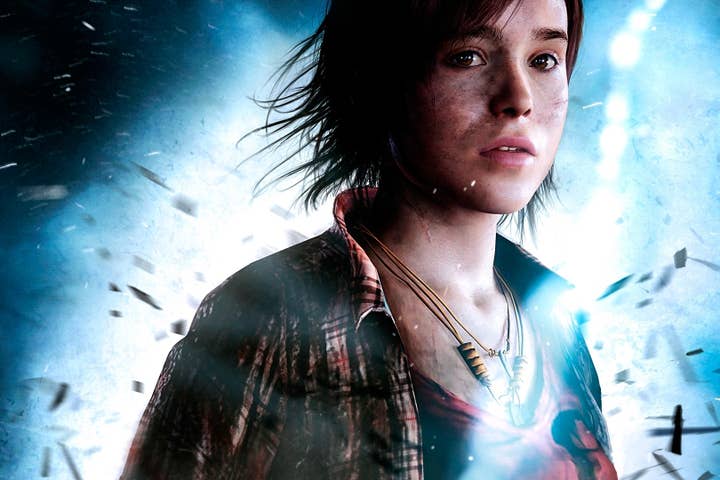Once More, With Feeling: The Ongoing Quest for Emotional Games
Quantic Dream's wild idea has started to take root, but what do we stand to gain from more meaningful games?
David Cage likes to talk about the future of video games, but less discussed is what the future looks like for David Cage.
Quantic Dream's founder, CEO and voluble frontman is one of the industry's most passionate figures, toiling in a narrow, sparsely populated trench of AAA development where feelings are of the utmost concern. With Fahrenheit and Heavy Rain, Quantic Dream offered tangible evidence of its stated belief that the battle-worn physicality at the core of gaming could be draped in luxurious emotional finery, to the benefit of both the medium and the industry as a whole.
"It's hard not to be a little pleased that someone like David Cage exists, and that a publisher has the gumption to fund his vision"
It wouldn't be unkind to suggest that opinions on Cage's work to date have varied - from vitriolic bluster to hyperbolic praise and all stops between - but the response to Quantic Dream's latest, Beyond: Two Souls, has been more negative than any game since Omikron, its debut release, almost 15 years ago. It is there in the reviews, which combine to form an aggregate score around 15 per cent lower than either Fahrenheit or Heavy Rain. And it is there on the forums and in the comments threads, where Cage's vocal detractors seem to have swelled in numbers.
As is often the case, Beyond's sales figures remain a mystery, but companies the size of Sony are seldom quiet when they have a hit on their hands. At the very least, it can safely be assumed that it hasn't outpaced Heavy Rain, which sold 1 million copies in less than two months. If the public have indeed failed to buy into Cage's idiosyncratic take on interactive storytelling in quite the same numbers, one wonders what the impact on Quantic Dream's direction might be.
In a sense, the value of Quantic Dream's contribution is beyond criticism: the unhappy truth is that innovation doesn't always equate to success, and it certainly doesn't have to suit every taste, but the very fact that Quantic Dream's games are so distinct is precisely what makes them so valuable. If you've ever tired of the AAA industry's narrow, sequel-drenched focus then it's hard not to be a little pleased that someone like Cage exists, and that a publisher has the gumption to fund his vision.
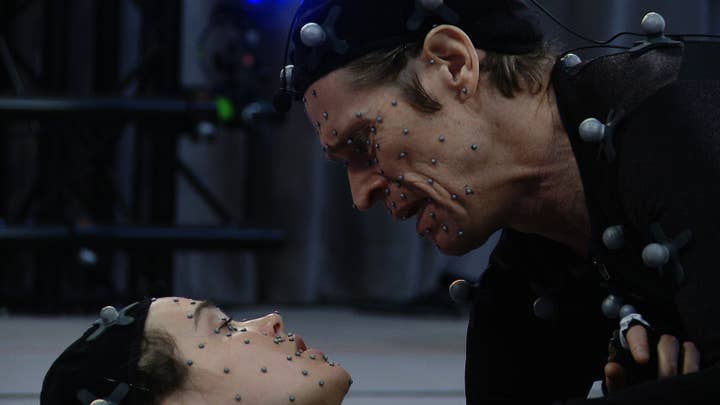
But the degree to which Sony would tolerate diminishing returns is less certain. Shuhei Yoshida has already stated his enthusiasm for Quantic Dream's next project - garnered, it must be said, after an "honest" feedback session about Beyond - but at some point the numbers do start to matter. Most publishers will greenlight another shooter, racer or sprawling RPG in spite of prior success, but the specificity of Cage's work practically guarantees a tailored response, and the smart money is on fewer chances to roll the dice.
I last talked to Cage In London, around a month before the launch of Beyond: Two Souls. Like WIll Wright and Hideo Kojima before him, Cage had been selected to deliver BAFTA's annual games lecture. It would prove to be an engaging discussion of Quantic Dream's work and his own overarching ambition to raise the cultural status of gaming by reaching past the industry's traditional audience - a treatise on the merits of speaking to a player's "heart and soul" rather than just their thumbs. Discussing the imminent launch of Beyond beforehand, however, Cage was in a more reflective mood.
"It's definitely a lot of pressure," he admitted. "Especially because...I don't think we're very good at explaining what we're trying to achieve. We don't pretend that we succeed in everything that we do, and we don't pretend that this is the only route. Our message is just that we're very excited by exploring this direction: storytelling, emotion and meaning.
"We don't pretend that we succeed in everything that we do, and we don't pretend that this is the only route"
David Cage, Quantic Dream
"We are in the strange position of having a publisher supporting us, getting excited by the same things, and giving us the time and the resources to try our ideas. Sometimes we find something, sometimes we fail, but that goes with the idea of exploration, of trying something new. I'm taking a risk with each game, and that's what's exciting about it.
"It's not always a pleasant position, because you're taking the risk but you're also taking the blows, and those blows will affect you more than the nice things. It's a strange position, and I can't really figure out how happy I am with it. Sometimes I just ask myself, 'Why am I doing this? What is there to gain?' I'm passionate about what I'm doing and I'm genuinely excited by what we do, but sometimes I think it's not reasonable."
I attended two talks given by Cage over the summer - one at BAFTA, the other a few weeks earlier at GDC Europe - and in both he positioned Quantic Dream as a prime mover in what has since become an industry-wide trend towards adding some emotional resonance to the stories within games. Certainly, the bemused response from executives at the pitch meetings for Fahrenheit over a decade ago carry an undeniable air of truth, and it seems fair that, to a greater or lesser degree, Quantic Dream has helped guide the medium towards its present concern with choice, consequence and something resembling moral complexity.
"And now here we are, years later, and the more time that passes the more people are understanding the importance of storytelling. Even in action games, actually, people see that having great characters and a great story just make the experience better. I'm glad we're in this position."
Glad may well be an understatement. For Cage, reaching "this position" roughly equates to a life's work; close to 20 years of prototypes and products, inching ever closer towards recognition and change. And it is to Cage's credit that he doesn't consider it a job well done, or even a task nearing completion. In his BAFTA lecture, he said that the language of storytelling for gaming was still being invented even now, describing his own games as "reference points" for future innovations that will serve the same function as spatial and temporal editing did for cinema. The abiding message: we haven't figured out the language yet, but we're adding new words all the time.
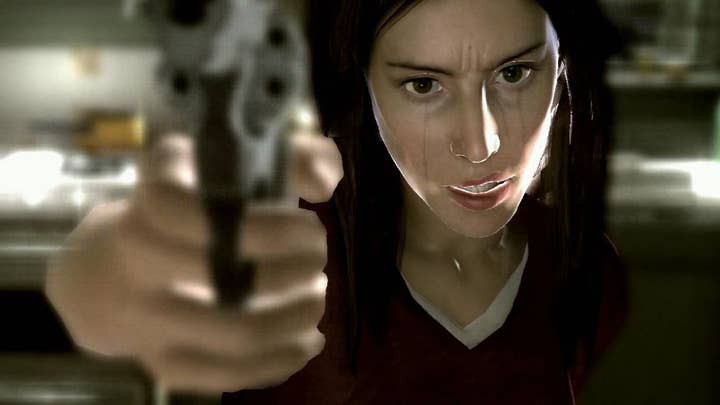
Beyond: Two Souls is a bittersweet demonstration of this point, a pristine, multi-million dollar reminder that the interactive language with which to tell emotional stories is as nascent as players' ability to properly assess and criticise it. Beyond feels like a more linear experience than Heavy Rain, and a survey of its reviews indicates that to be one of the key factors driving its percentage average down. In part, however, this is an erroneous observation made possible by Quantic Dream's growing skill at making the story's decisive moments feel organic. There are no conversation wheels with choices delineated by angry red and calming blue, but a few playthroughs show the narrative branching in subtle and unexpected ways: entire sections of the game are closed off to those who made certain decisions, and open to those who didn't. There are many more examples of this than the tone of the more negative reviews would suggest. The fact that they slip by unnoticed is arguably a minor victory for Quantic Dream.
However, the fact that the game 'feels' linear to so many critics should not be ignored. True, they may not be extending quite as much credit to Quantic Dream as its track record has earned, but there is ample evidence that Cage and his team misjudged what people want from an interactive experience. Beyond is brimming with moments where the player is called upon to participate in ways that feel entirely arbitrary: Jodie is handed an item, and the story is frozen in time until the player hits a prompt to receive it, despite that being the only available choice; a tilt-prompt appears on-screen as Jodie dances with a boy, but the player's input does nothing to change the motion or mood of the characters. In these moments, it is entirely reasonable to ask why it isn't just a cut-scene.
"It's not always a pleasant position, because you're taking the risk but you're also taking the blows. Sometimes I just ask myself, 'Why am I doing this?'"
David Cage, Quantic Dream
There are wonderful moments too, of course, when Beyond uses these small interactions to add texture to its characters - Jodie's endearingly stilted preparations for her first ever date being a prime example - but far too often they only serve to obscure the points when the player has real control. Indeed, when and where the player is called upon to act doesn't appear to be defined by a consistent logic, which diminishes the player's sense of agency and, in turn, their emotional investment in the story. Beyond remains a unique example of interactive entertainment, but any capacity to stir the soul seems to flow from the script and the performances of its cast rather than any aspects that are intrinsic to games.
Viewed from this perspective, Cage seems to underestimate the power of his own guiding ideals. Both in his talk and during our interview, he places the quest for emotive games in the same frame as technical goals like animation, lighting and photo-realistic graphics - Quantic Dream has, like a great many other studios, has spent a great deal of money creating proprietary technology to capture the expressive range of its actor's performances.
"When you want to create interactive storytelling and emotions you have to deal with a lot of technical constraints, pretty much with all aspects of the game," Cage said. "From virtual actors to cameras to animations to sound - everything is a technical challenge."
And yet he also expresses his sincere admiration for indie games, in which uncannily animated Willem Defoes and Ellen Pages have little or no bearing on emotional weight. In games like Papers Please and Cart Life, for instance, the nature of the player's tasks are not supplemental to the story - they are the story. In each case, the graphics and production values pale in comparison to any of Quantic Dream's games, but it can be persuasively argued that they are every bit as provocative and emotionally resonant as Beyond - some would say even more so.
Vander Caballero is one such independent developer. Once a creative director at EA Montreal, Caballero became tired of the AAA industry's relentless focus on violence, viscera and a truncated emotional palette: anger, frustration, competition, fear and pretty much anything that gives the player's adrenal glands a thorough workout. Born in Colombia, Caballero grew up in a world torn apart by conflict, where revenge and violence were part of an ugly, escalating routine. Caballero believes that, with his life experience, many more developers would take the sort of stand he did when he walked away from EA's Army of Two franchise.
"I've seen a really violent society. I've seen people struggling," he says. "For me, it really was very difficult to make Army of Two. It was difficult for me to be with a bunch of little psychopaths.

"I've seen this before. It's not pretty, it's not nice. There's a social complexity to human struggle in the world, and I didn't want to support that. I wanted to do a game that changed that. I jumped when digital distribution became an opportunity. I thought, 'this is the time.'"
The game that Caballero jumped to, Papo & Yo, was a quiet success for the PlayStation Network. More to the point, it was an evocation of Caballero's experiences growing up with an alcoholic father, the grim push-and-pull of intervention and abuse rendered in abstract visuals and familiar mechanics. It used the tropes and conventions of gaming to communicate an entirely personal, and emotionally powerful, story. "It's a hard story, but it's my story," Caballero says. "It proves that you can have something deep and meaningful in a game. Technology is not impeding you. It's just the intention of the creator, and the role the creator is willing to take on."
This idea of the 'role of the creator' is a common feature in discussions with designers working in this area. It isn't that Caballero and those like him are entirely opposed to the violence and visceral destruction common to video games, but the way it is deployed without meaning or message, the way that the context is so often warped to suit a world defined by carnage, that is a significant and growing problem. The time has come, Caballero argues, for creators to start questioning their instincts, to use moral sense as more than just dialogue option.
"I've seen a really violent society. For me, it was very difficult to make Army of Two. It was difficult for me to be with a bunch of little psychopaths"
Vander Caballero, designer of Papo & Yo
"We have to have social responsibility in the games that we make if we want to move the medium forward. A great example is Bioshock Infinite. You start that game and it has this amazing beginning, and you think, 'Wow, this guy Ken Levine is like George Orwell, it's the best thing ever!' And then..."
Caballero mimics the sound of an aircraft careening towards the ground, using his hand to illustrate a downward spiral towards a loud explosion of crunching metal.
"The game goes downhill from that, and so I ask, what social role does the creator play there? As games become bigger and bigger, there is a need for creators to stand for more."
Of course, this is already happening among independent developers, and has been for some time. However, Caballero quickly shoots down the notion that major publishers are somehow exempt from this sort of progress. The fact that Quantic Dream remains an anomaly in the landscape of AAA development should not be taken as proof that the market cannot bear more large-scale projects that tread a similar path. Indeed, Caballero claims that the ideas already exist within companies like EA, but conservatism prevents them from being developed any further.
"The problem is not making the content," he says. "I worked in a top AAA developer, I did a lot of R&D and created some beautiful stuff, and I know other people at big publishers that make really, really beautiful stuff. But it'll never come out. If people knew the sort of stuff that EA creates that never gets out, they would love the company."
For Gearbox Software's Paul Hellquist, however, pushing a multi-million dollar, 20-hour game beyond the gut and towards the heart and head comes with a host of difficult challenges. The Borderlands franchise - on which Hellquist has served as a creative director - is as close as video games come to pure comedy, but for the most part its form and its content remain distinct. There are jokes and punchlines almost everywhere you look, but rarely outside of the writing. Only on rare occasions does a laugh arise from the mechanics, in the way that Papo & Yo creates a gameplay system that expresses the reality of dealing with an addict.
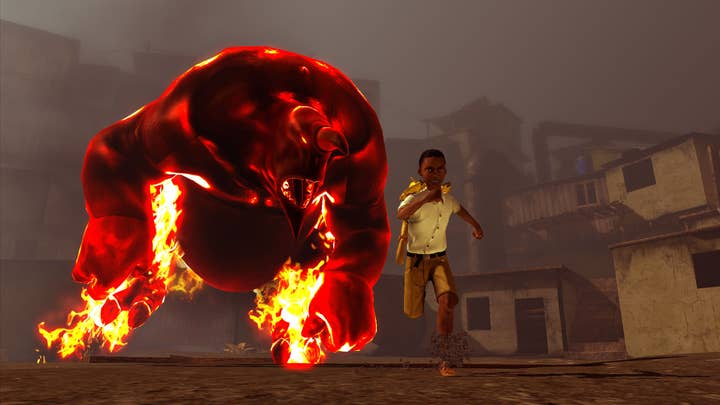
In that sense, Hellquist says, video games are restricted in terms of tone compared to more mature art forms. The demands of making a AAA game in the modern industry - production values, playing time, DLC drops, and so on - inevitably push teams towards familiar techniques simply to create enough content to the desired standard. That Borderlands 2 is so consistently funny is a remarkable achievement, but, like so many games, it is an action experience by basic necessity. The same is true of Naughty Dog's Uncharted series: a knockabout comedy-adventure whose amiable hero breaks up the treasure-hunting with the merciless obliteration of hundreds of people.
"With movies, you get put into one of four or five buckets: action/thriller, romance, comedy, drama, horror. With games, you have action. There are just different forms of action, and there's very little elsewhere," he says. "I can't wait for us to be able to create experiences that are compelling in a different way to 'shoot' or 'jump' - things that, for the most part, we've inherited from, y'know, Contra, Space Invaders, things a long time in the past.
"But the reason why we still do those things so much is that we can do them so well. Our technology for depicting broader subjects is just coming to a point where people don't just look at it and think, 'Eurgh.' We're just starting to get there with technologies like facial mo-cap, but we're still just using it in the designer stories. I think Elizabeth from Bioshock Infinite is a good example of trying to bring that sort of experience into the simulation and into those player stories.
"When the game can recognise your tone and your attitude, then I think we really reach the golden age of role-playing"
Paul Hellquist, Gearbox Software
"What other verbs can we give the player. That's the big challenge we really need to figure out."
Put simply, best intentions can only carry you so far, and right now designers are hampered by their tools. For the emotional content of games to become more than just a blanket draped over familiar systems, it will demand technology of greater sophistication than any we currently possess. And it will be technology of a different kind to the sort of performance capture tools being developed at Quantic Dream. In fact, while he never mentions Kinect by name, Hellquist strongly suggests that Microsoft's much-maligned array of microphones and sensors could be a milestone on the long road to greater creative freedom.
"I don't think we're really going to get there until we talk to the games. Until we can interact with characters simply by speaking, instead of three choices that some writer or designer has determined - the only attitudes that you can ever have.
"When the game can recognise, through voice recognition or whatever else, your tone and your attitude, so the character can react more based on your inputs, then I think we really reach the golden age of role-playing. At that point you can get into any genre, so you could have love stories and things like that. You will be able to connect with a character in a way that your guns will never allow."
It would be easy to dismiss this sort of discussion as so much patchouli-scented navel-gazing were it not for one vital point: Cage, Hellquist and Caballero all believe that the stunted development of gaming's emotional side means that huge sums of money are being left on the table. On the approach to any new generation of consoles, the wider discussion becomes dominated by what the hardware can do for early adopters - essentially, the captive audience of core gamers that will queue for their console no matter what.
However, the industry's real goal is growth on a much wider scale, bringing in new customers from untapped demographics. In part, these new audiences have been overlooked due to archaic distribution and pricing - as the explosion in mobile and free-to-play proves - but there are still millions more who feel alienated by the content. David Cage is making games for people that don't usually play games more than those who sink dozens of hours into Battlefield, while Caballero wants his next project on as many platforms as possible. Console gamers have an expectation of input complexity, he tells me, and he wants to make games that reach the people who find the control pad hostile and limiting.
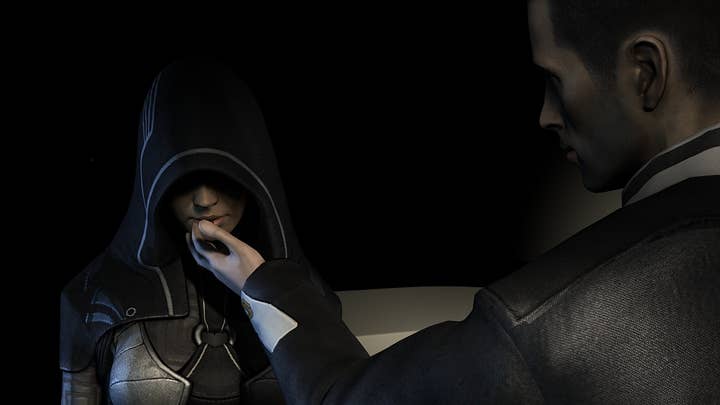
Indeed, the debate over gender balance in the games industry - a frequent topic of discussion in recent times - is inextricably tied to the emotional content of the industry's products. The reasoning should be familiar by now: with more female voices in development the very nature of the games being created will change, making it a more inclusive and popular form of entertainment in general, and a more seductive career choice for a greater diversity of people. Though some have argued about the extent of the problem, few would dispute the worthiness of the overall goal, and Schell Games' Heidi McDonald is convinced that progress in "empathic games" will be a catalyst for both equality and growth.
McDonald is the architect of the "NPC Romance Project," an attempt to better understand the value of romantic relationships in game stories, and the industry's near-total reluctance to engage with a concept that has proved enduringly popular in every other entertainment medium. McDonald is collecting data from a series of surveys exploring player motivations, behaviour and satisfaction in games with some mechanics based around romance - principally, RPG series like Fable, Persona, Mass Effect and The Elder Scrolls. Products with a focus on sex, like Hentai Games, are excluded - their focus on physicality, she tells me, ticks many of the same boxes as a shooter in terms of target audience.
"We're starting to see a shift, where emotional mechanics are more important to a larger group of people than those based on the visual and the physical"
Heidi McDonald, Schell Games
McDonald is no idealist. She understands that, for a series like Dragon Age to drill down into its romantic systems, it needs to be made clear that they are a major contributor to enjoyment of the product. Put bluntly, It needs to be expressed in dollars. Fortunately, the NPC Romance Project's early results offer overwhelming confirmation that emotional relationships in games like those made at Bioware are a powerful incentive for their players, and if the EAs of the industry require further persuasion of the commercial potential of romance isn't difficult to find. McDonald points to 50 Shades of Grey, Twilight and an entire sub-genre of literature dominated by Kindle-toting and mobile-savvy female consumers. They have the devices, they have the money, and yet they are being ignored by the part of the industry with the most dire need for new customers.
"Emotional satisfaction will become a major player motivation," she says. "I think it has been the wrong time until now, but the time is right for this, and if it isn't right now then it will be very, very soon. We have all of these different factors that are starting to converge, and they will create a climate that is ripe for it."
"Perhaps the larger point here is that we're starting to see a shift, where emotional mechanics are more important to a larger group of people than those based on the visual and the physical. Empathic games are becoming more of a market force, and that's the most important driver of all... It doesn't mean that you won't still be pushing buttons, or that the art will be any less stunning in empathic games. It just means that emotional fulfilment will be the core design thesis.""
In fact, McDonald believes she may have been conservative in her assessment of this fundamental shift in the market dynamics of the games business. The relentless progress of mobile and PC hardware, and the fluidity of digital marketplaces like Steam and the App Store, allow new trends to form, rise and reach their tipping points in ever decreasing amounts of time. As Tom Abernathy, a narrative designer for Microsoft and Riot Games, indicated in his talk at GDC this year, the trend isn't just coming - it's already here, and console companies will ignore the diverse demands of the modern marketplace at their peril.
"Our industry, our art, and our business stand to gain in every sense simply by holding a mirror up to our audience and reflecting their diversity in what we produce."
"Our audience is leaving us behind. The world is changing - it has already changed - and we have not been doing a very good job of keeping up with it. Women are not a small special market on the fringe of the core: Women are the new core."
